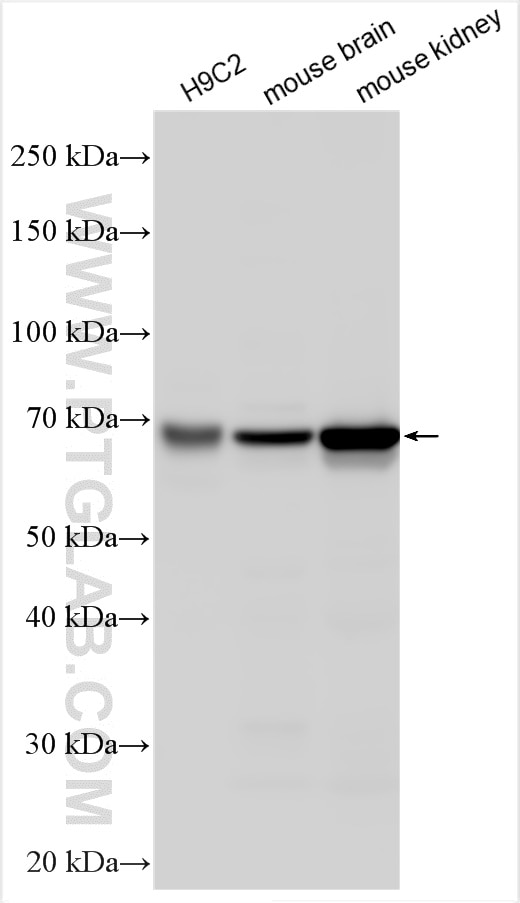Tested Applications
| Positive WB detected in | H9C2 cells, mouse brain tissue, mouse kidney tissue |
Recommended dilution
| Application | Dilution |
|---|---|
| Western Blot (WB) | WB : 1:500-1:1000 |
| It is recommended that this reagent should be titrated in each testing system to obtain optimal results. | |
| Sample-dependent, Check data in validation data gallery. | |
Product Information
20834-1-AP targets SLC22A24 in WB, ELISA applications and shows reactivity with human, mouse, rat samples.
| Tested Reactivity | human, mouse, rat |
| Host / Isotype | Rabbit / IgG |
| Class | Polyclonal |
| Type | Antibody |
| Immunogen |
CatNo: Ag14907 Product name: Recombinant human SLC22A24 protein Source: e coli.-derived, PGEX-4T Tag: GST Domain: 1-156 aa of BC034394 Sequence: MGFDVLLDQVGGMGRFQICLIAFFCITNILLFPNIVLENFTAFTPSHRCWVPLLDNDSVSDNDTGTLSKDDLLRISIPLDSNLRPQKCQRFIHPQWQLLHLNGTFPNTNEPDTEPCVDGWVYDRSSFLSTIVTEWDLVCESQSLKSMVQSLFMAGS Predict reactive species |
| Full Name | solute carrier family 22, member 24 |
| Calculated Molecular Weight | 322 aa, 36 kDa |
| Observed Molecular Weight | 62 kDa |
| GenBank Accession Number | BC034394 |
| Gene Symbol | SLC22A24 |
| Gene ID (NCBI) | 283238 |
| RRID | AB_3085623 |
| Conjugate | Unconjugated |
| Form | Liquid |
| Purification Method | Antigen affinity purification |
| UNIPROT ID | Q8N4F4 |
| Storage Buffer | PBS with 0.02% sodium azide and 50% glycerol, pH 7.3. |
| Storage Conditions | Store at -20°C. Stable for one year after shipment. Aliquoting is unnecessary for -20oC storage. 20ul sizes contain 0.1% BSA. |
Background Information
SLC22A24, an orphan transporter, belongs to the SLC22 family, which transports organic ions. SLC22A24 is conserved among higher order primates, but has diverged within lower level primates and other mammals.
Protocols
| Product Specific Protocols | |
|---|---|
| WB protocol for SLC22A24 antibody 20834-1-AP | Download protocol |
| Standard Protocols | |
|---|---|
| Click here to view our Standard Protocols |




